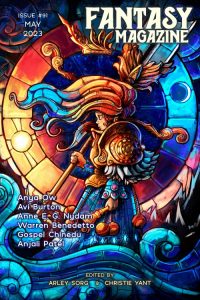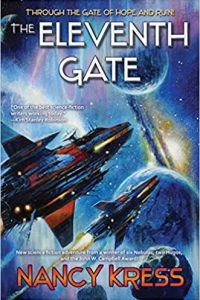Charles Payseur Reviews Short Fiction: Strange Horizons, Fantasy, and Diabolical Plots
 Strange Horizons 4/17/23, 4/24/23, 5/1/23, 5/8/23, 5/15/23
Strange Horizons 4/17/23, 4/24/23, 5/1/23, 5/8/23, 5/15/23
Fantasy 5/23
Diabolical Plots 4/23
Strange Horizons closed out April with the poem ‘‘In a country where history is only a memory that has grown older’’ by Michael Imossan, which imagines the world as a stage and the plot of the play something of a tragedy. The narrator has lost a brother to the violence of bullets and the people and nations behind them, and no matter the time or change afterwards, that death follows the narrator. They slip into a future where the wounds are still felt, where the memories might be called history but are still present, in the people and in the ghosts that linger. In the narrator’s brother, who might rise and greet the narrator as someone else, an older family member – a sign that time has passed but some things are frozen, immutable, and silenced. It’s a beautiful and powerful read. Kicking off May, Avra Margariti is back, this time with ‘‘Death Comes for the Sworn Virgins’’, where four men sought to escape a stifling life for the unknown of the wilderness and the first thing they found was loss, as one of them fell to his death. The three survivors are hurt, broken, but a new arrival helps to knit them back together. Margariti moves the perspective between the characters, building up the full picture of their yearning, their loves, their fears. And finding in them a strange, wonderful possibility. That people can build their own shrines, their own homes, and find a place to belong, fully accepted and accepting of the loves in their lives. The mood is eerie and haunted, wounded but on the mend thanks to patience and kindness in the face of all things.
Mark Dimaisip details a home defined by superstition and folklore in ‘‘The Untaken’’, where the narrator and their father try to keep themselves safe from the dangers of the world, couching their lives and actions in ritual to avoid misfortune and predation by supernatural threats. The piece shows how this act of ritualizing daily life is an attempt to make sense of the fortune, guilt, and fear of those who have survived when others have been taken. Imagining those people just didn’t perform the necessary ritual is a way to assume order on what might be random or senseless deaths, and Dimaisip shows how that kind of mentality, almost bargaining, works in a world full of hungry shadows. And finally, Eugenia Triantafyllou keeps the feelings of ghosts and being haunted going in ‘‘Undog’’. In the story, the narrator has moved out of a toxic home and into their own space only to find the new home already occupied by a dog who should have died long ago – who perhaps did. And yet the haunting here is not as malevolent as the phone conversations the narrator has with their mother, and the emotional damage they’re trying to heal from. The story is surprisingly warm, for all the grisly elements, and Triantafyllou does an amazing job of building emotional investment in the narrator and their relationship to the zombie dog they are cohabitating with.
The May issue of Fantasy mixes history, magic, family, and divinity in its fiction and poetry. Anya Ow weaves a historical fantasy set near Singapore in the war-torn 1940s in ‘‘God of the River’’, which finds A Ling living with her grandmother, Popo, in a home that, for a while at least, seems separated from the conflict closing in around it. A Ling learns from her grandmother not just about the unfair compromises that often make up life, but of the fickle and dangerous gods who live around them, like the titular God of the River, who will take offerings but whose ability to change the world is rather limited. Still, when the war finally comes knocking, A Ling and Popo have few other places to turn to, and Ow balances the realities of violence with the power of family and the complexities of justice. It’s worth spending some time with. On the poetry side of the issue, Anjali Patel echoes those themes of family and divinity in ‘‘Legacy’’, where the narrator discovers that their parents were gods who have diminished. They are now mundane, doing menial work and struggling to provide for their family in a new home far away from the power they once knew. For the narrator, though, that power still exists and can be felt, and it’s a connection back to something vast and wonderful that they might have suspected, and certainly yearned for. But Patel shows that the revelation doesn’t fix much, doesn’t reignite the divine powers that have been lost, and the poem looks ahead with fear and hope both for what the narrator can be with such an inheritance.
The May issue of Fantasy mixes history, magic, family, and divinity in its fiction and poetry. Anya Ow weaves a historical fantasy set near Singapore in the war-torn 1940s in ‘‘God of the River’’, which finds A Ling living with her grandmother, Popo, in a home that, for a while at least, seems separated from the conflict closing in around it. A Ling learns from her grandmother not just about the unfair compromises that often make up life, but of the fickle and dangerous gods who live around them, like the titular God of the River, who will take offerings but whose ability to change the world is rather limited. Still, when the war finally comes knocking, A Ling and Popo have few other places to turn to, and Ow balances the realities of violence with the power of family and the complexities of justice. It’s worth spending some time with. On the poetry side of the issue, Anjali Patel echoes those themes of family and divinity in ‘‘Legacy’’, where the narrator discovers that their parents were gods who have diminished. They are now mundane, doing menial work and struggling to provide for their family in a new home far away from the power they once knew. For the narrator, though, that power still exists and can be felt, and it’s a connection back to something vast and wonderful that they might have suspected, and certainly yearned for. But Patel shows that the revelation doesn’t fix much, doesn’t reignite the divine powers that have been lost, and the poem looks ahead with fear and hope both for what the narrator can be with such an inheritance.
The May Diabolical Plots takes two stories from very different ends of speculative fiction – one far future science fiction, one ‘‘classic’’ second-world fantasy – and complicates them with framing devices that evoke non-fiction. In ‘‘Diamondback V. Tunnelrat’’, Nick Thomas frames the story as a kind of legal brief summarizing a case between a troll who lost an ear and a dwarf who accidentally discovered that when said ear was grafted onto her head following the loss of her own, it became functional. The heart of the legal dispute is the ownership of said ear, and the implications surrounding the discovery that troll body parts can be used to repair damaged bodies of other, non-troll beings. Thomas does a remarkable job showing both the power and limitations of courts in arriving at justice, because for there to be just results there need to be just laws. The result isn’t perfect, but the story shows that often seemingly intractable positions can find common ground and compromise that reach for justice, even if there might be room left to go.
Recommended Stories
‘‘God of the River’’, Anya Ow (Fantasy 5/23)
‘‘Diamondback V. Tunnelrat’’, Nick Thomas (Diabolical Plots 5/23)
Charles Payseur is an avid reader, writer, and reviewer of speculative fiction. His works have appeared in The Best American Science Fiction and Fantasy, Lightspeed Magazine, and Beneath Ceaseless Skies, among others, and many are included in his debut collection, The Burning Day and Other Strange Stories (Lethe Press 2021). He is the series editor of We’re Here: The Best Queer Speculative Fiction (Neon Hemlock Press) and a multiple-time Hugo and Ignyte Award finalist for his work at Quick Sip Reviews. When not drunkenly discussing Goosebumps, X-Men comic books, and his cats on his Patreon (/quicksipreviews) and Twitter (@ClowderofTwo), he can probably found raising a beer with his husband, Matt, in their home in Eau Claire, Wisconsin.
This review and more like it in the July 2023 issue of Locus.
 While you are here, please take a moment to support Locus with a one-time or recurring donation. We rely on reader donations to keep the magazine and site going, and would like to keep the site paywall free, but WE NEED YOUR FINANCIAL SUPPORT to continue quality coverage of the science fiction and fantasy field.
While you are here, please take a moment to support Locus with a one-time or recurring donation. We rely on reader donations to keep the magazine and site going, and would like to keep the site paywall free, but WE NEED YOUR FINANCIAL SUPPORT to continue quality coverage of the science fiction and fantasy field.
©Locus Magazine. Copyrighted material may not be republished without permission of LSFF.







